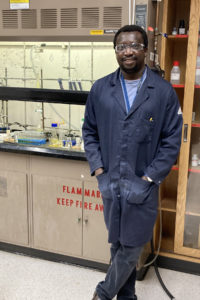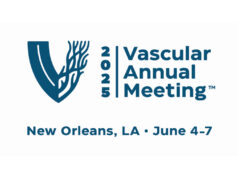
University of Michigan resident and Vascular Specialist resident/fellow editor Christopher Audu, MD, has been granted the SVS Foundation Resident Research Award for 2022. And, already, he is looking ahead to where the research might go next, and the wider importance of addressing his chosen research topic—wound healing—which he describes as a common and persistent problem in vascular surgery and beyond.
The award is given out to a resident in training who has engaged in basic science research, with the aim being to encourage scientific endeavors in the field of vascular surgery. Applicants must submit letters of recommendation and a summary of their research, as well as a manuscript that is in its preliminary stages. The award is given out annually, and the prize is an opportunity for the winner to present their work at the Vascular Annual Meeting (VAM). Audu’s paper will kick off the William J. von Liebig Session, the first plenary, Wednesday, June 15, from 8–8:10 a.m. (Hynes Convention Center, Ballroom A/B). “This is the biggest stage that we have for vascular,” says Audu, describing the significance of the annual conference in the vascular surgery field. This year, Audu’s research into the proteins involved in diabetic wound healing stood out among the competition and, in doing so, earned a place on the agenda of this year’s meeting.
Specifically, under the guidance of Katherine Gallagher, MD, Audu has been looking at one of several reasons why wounds do not heal—inflammation— and his work suggests there may be a “light switch” that controls various inflammatory pathways. Audu has been working on the prize-winning research for the past year and a half, he tells Vascular Specialist. At the University of Michigan, residents are allowed two years in between their training for professional development. “I used those two years as my post-doctoral years in the laboratory to pursue this research,” Audu explains.
Wound healing, he notes, is a common problem in vascular surgery that has “defied a lot of treatment options,” particularly when it comes to medications. “Usually, these patients have very poor circulation to the extremities—their fingertips and their toes are often the worst hit—and when they get wounds there, they just do not heal,” he explains. With his current research, Audu is “picking away” at one of the many reasons why wounds do not heal, which is ongoing inflammation.
Audu details that the aim of his research was to understand what it is about macrophages in wounds that prevent them from healing. He considered a particular protein called JMJD3, which he discovered is involved in turning on cytokines that play a role in inflammation. “Initially, you need some sort of inflammation when you get a bruise, and then that should transition to a point where you are healing,” says Audu. “In the diabetic state, what we found was that that signal is on way longer than it needs to be, and that this particular enzyme, JMJD3, is partly responsible.” In addition, the team found that this enzyme turns on a number of other genes that are involved in inflammation.
Audu and his colleagues in the Gallagher lab then tried to understand these processes mechanistically, he continues, reporting that they were able to find a small molecule that could specifically inhibit macrophages in the wound and thereby improve wound healing in a diabetic mouse model. Audu notes that this research originated with Gallagher—the principal investigator of the study and an “expert” in epigenetics and in wound healing, according to Audu, as well as a vascular surgeon. When Gallagher pitched the research project to Audu, he recounts that he simultaneously pitched the idea of looking at a particular pathway called STING—an acronym for stimulator interferon genes. “So, we put our heads together and came up with a joint project that combined both of our interests,” Audu recalls.
“The work that we have done mechanistically shows that there is a way to target inflammation, and maybe even target a ‘light switch’ that controls several different inflammatory pathways—that’s the big picture idea,” he summarizes.
A medicinal chemist by training, Audu is eager to “take a project from the beginning right through to finding something that could be a therapeutic angle.” Looking at what is next for the research, he states that the first step will be to get the paper published, but what he hopes for subsequently is that the team develop this “therapeutic angle” into something that can be applied directly to wounds.
Wound healing in diabetic patients is “important to most vascular surgeons,” says Audu, pointing to a desire within the specialty to find solutions for this patient population. But the problem is not confined to vascular surgery, and it is not only vascular surgeons who want to see changes in this area. Indeed, Audu points to the fact that specialists in various other areas, such as plastic surgery and podiatry to name just two, also encounter these patients on a regular basis.
Elsewhere in the Gallagher lab, Audu details that he is involved in some other research into the multitude of different types of cells within wounds that could be contributing to poor wound healing and diabetes. Outlining this other research, he says that it revolves around the fact that certain cells are known to interact with a person’s T-cells, and that those T-cells are known to facilitate chronic inflammation in wounds, particularly if they overproduce inflammatory cytokines. “We have found that diabetic pDCs [plasmacytoid dendritic cells] are altered, and they are actually involved in turning these T-cells into inflammatory phenotype.” Details will be presented in a poster at VAM, he says. Further down the line, Audu is keen to bring his expertise in chemistry to vascular surgery and usher in drug development and design as a focus. “In the future, I hopes this is something I can advance in my own lab someday.”
Aside from presenting his prize-winning science and some poster work, Audu is also looking forward to the in-person aspect of this year’s meeting. “I’m excited about meeting people in person who I have only even seen in Zoom meetings. That will be a highlight.”












